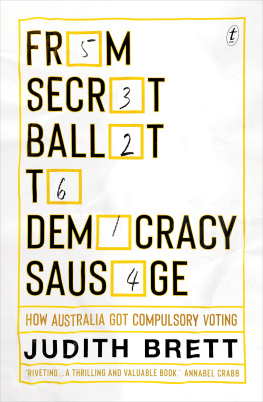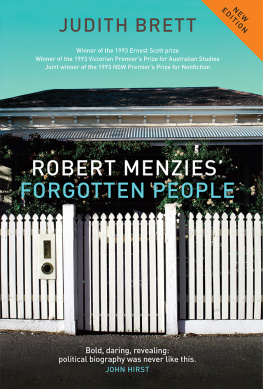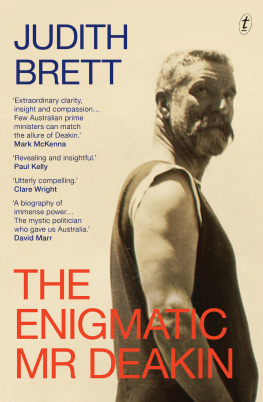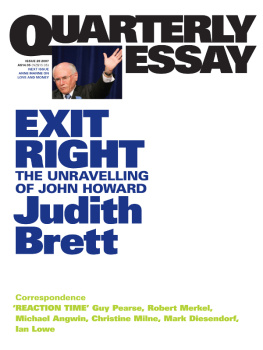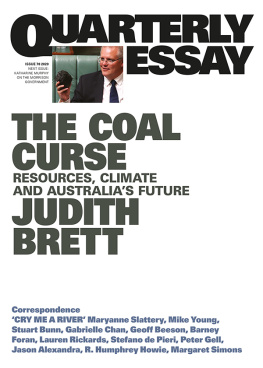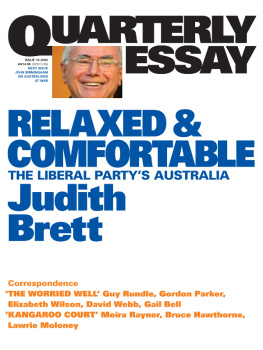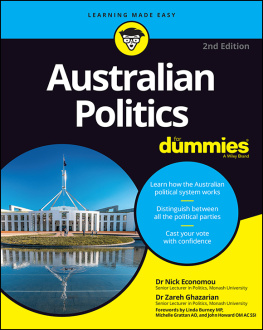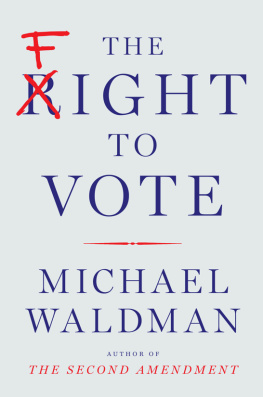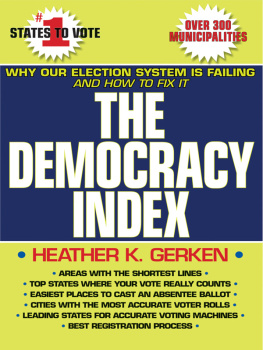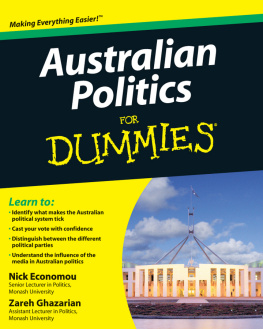
It's compulsory to vote in Australia. We are one of a handful of countries in the world that enforce this rule at election time, and the only English-speaking country that makes its citizens vote.
Not only that, we embrace it. We celebrate compulsory voting with barbecues and cake stalls at polling stations, and election parties that spill over into Sunday morning.
But how did this come to be: when and why was voting in Australia made compulsory? How has this affected our politics? And how else is the way we vote different from other democracies?
Lively and inspiring, From Secret Ballot to Democracy Sausage is a landmark account of the character of Australian democracy by the celebrated historian Judith Brett, the prize-winning biographer of Alfred Deakin.
CONTENTS
NOT MANY COUNTRIES compel their citizens to vote, but Australia is one. Voting is compulsory in nineteen of the worlds 166 electoral democracies and only nine strictly enforce it. None of Europes most influential democracies has it, and none of the countries in the mainstream of Australias political development: not the United Kingdom, the United States, Canada, New Zealand or Ireland.
People from our sister democracies are often astonished that Australians are compelled to turn up to vote: it seems an affront to freedom. We in reply are appalled at their low turnouts and the election of leaders and governments by a minority of voters. In the 2016 American presidential election the percentage turnout was in the high fifties. Donald Trump did not have the support of the majority of voters, but neither would Hillary Clinton had she won.
It has been compulsory to vote in Australian federal elections since 1924, when a private members bill passed through both houses in a single day with scarcely any debate. Geoffrey Sawer, doyen of Australias legal historians, famously wrote, No major departure in the federal political system had ever been made in so casual a fashion. Sawer was wrong: the ease of the bills passage was not because of lack of attention. Rather, it was uncontroversial because it expressed the political culture that had developed in Australia since the middle of the nineteenth century, when the colonies became self-governing.
This political culture was majoritarian and bureaucratic. Australians wanted their governments to have the support of the majority of electors, they preferred their elections to be orderly and they were happy for them to be run by government officials. By the time voting was made compulsory for federal elections, the arguments for and against had been thoroughly aired, and for thirteen years it had been compulsory for all eligible adults to be on the electoral roll. The paucity of debate Sawer noted was not a sign of indifference but of relaxed acceptance of an outcome long in the making.
Support for compulsory voting among Australians is consistently high. Since the earliest opinion polls on the matter, in 1943, it has never been less than 60 per cent. Support grew in the decades following World War Two and since 1967 it has bounced around in the 70-per-cent range. The lowest was 64 per cent in 1987, and the highest 77 per cent in 1969 and 2007, both elections in which there was a surge to Labor. Respondents
How did compulsory voting become so entrenched in Australias political culture and why is it that, alone among English-speaking democracies, Australia compels its citizens to vote? Who pushed for voting to be made compulsory, in what circumstances and using which arguments? Who argued against it? How, and why, did these arguments fail? What other aspects of our electoral system support the acceptance of compulsory voting?
Compulsory voting and enrolment are not the only distinctive features of our elections. We vote on Saturdays, the United Kingdom on Thursdays because it was once market day, and the United States on Tuesdays. We have preferential voting, whereas the norm is first-past-the-post, in which the candidate with the most votes wins. We can vote at any electoral booth in our home state, as well as interstate and at our overseas embassies and consulates. And our elections are run by government bureaucrats, according to uniform rules, with political parties and politicians at arms-length.
Australias embrace of compulsory voting tells us a great deal about the way our history has shaped our political culture. When he was president, Barack Obama praised Australias mandatory voting and said that if everybody in the United States voted, it would completely No doubt he knew that this would have little chance in a country which places a higher value on the liberty of the individual than on the collective good. Too many would argue that it was undemocratic, authoritarian, an infringement of an individuals rights.
The United States and Australia were both settled by people from the British Isles, who brought with them the political traditions and ideas of their home country, but they were settled in different centuries. The dominant political ideas were different, and so were the problems which preoccupied political reformers and which they tried to solve in these two new societies.
Liberal democracies are hybrid political systems which combine the rule of law and commitment to civil rights with popular elections and majority rule. There are obvious tensions between the need to protect individuals from the tyranny of the majority and the need for the majority to be protected from powerful minority vested interests. Australians are as appalled by American gun laws, with their protection of the right of individuals to bear arms, as Americans are by our compulsory votingmore so, as compulsory voting never killed anyone. Different polities strike different balances. Where the United States favours liberty and rights over democracy and majorities, we favour democracy and majorities over liberty and rights.
The early settlers to America left Britain when parliament was still struggling to wrest control of government from the monarch and when individuals were persecuted for their religious beliefs. Americas informing spirit is the seventeenth-century English philosopher John Locke. In his Two Treatises of Government Locke rejected the divine right of kings and argued that a governments authority derived from a social contract among individuals who transferred some of their natural rights to life, liberty and property to a government. If the government failed to protect these rights, then these rights-bearing individuals could legitimately overthrow it. Locke was a Puritan, and his argument justified parliaments revolt against the two Stuart kings Charles I and James II.
Locke gave the Americans the arguments they used to declare their independence from the distant autocratic British government and establish a new nation. The Declaration of Independence begins:
We hold these truths to be self-evident, that all men are created equal, that they are endowed by their Creator with certain unalienable Rights, that among these are Life, Liberty and the pursuit of Happiness.That to secure these rights, Governments are instituted among Men, deriving their just powers from the consent of the governed,That whenever any Form of Government becomes destructive of these ends, it is the Right of the People to alter or to abolish it, and to institute new Government.
The important point to notice here is that individuals and their rights come first, and that government comes after. It is a bottom-up movement in which the state only has as much authority as is transferred to it by its citizens for purposes of mutual benefit and protection. This makes compulsory voting a logical impossibility. If it is the votes of free, rights-bearing citizens which create the state and give legitimacy to its authority, then the state cannot compel citizens to vote as it has not yet been voted into existence.
Next page
